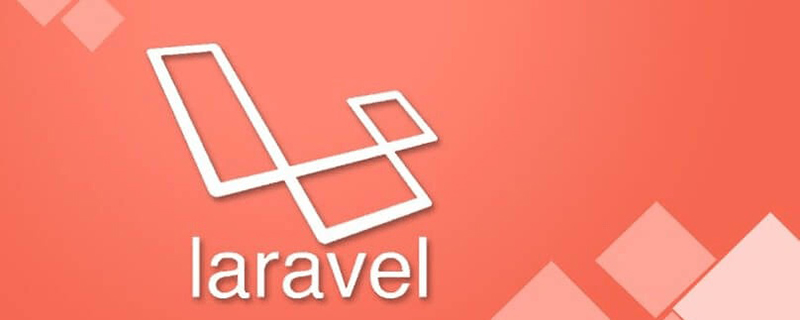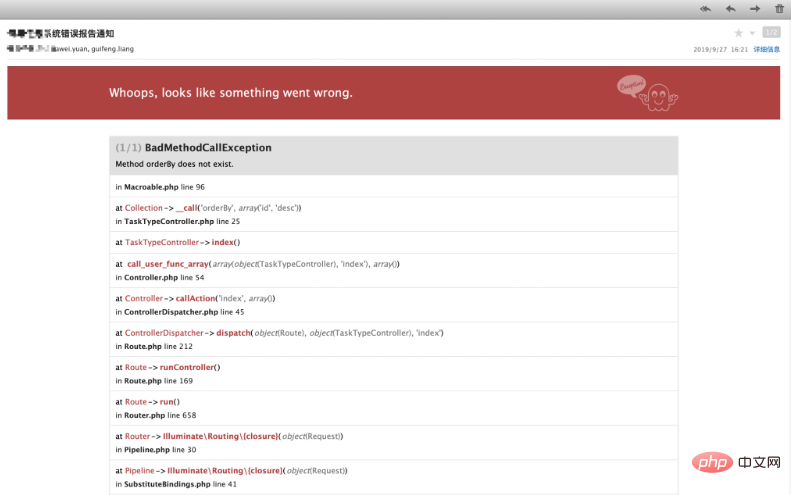Laravel email push system exception

Foreword:
In daily development, we may write some bugs, but the project is already online , we cannot get feedback from customers immediately, so the email error reporting system comes in handy. We all know that laravel’s exception handling needs to be handled through the Handler.php file, so let’s start here
1. Determine whether you need to send an email in the report method. The code is as follows:
public function report(Exception $exception)
{
//判断是否需要发送邮件
if (config('mail.mailException.report')) {
$this->mailReport($exception, config('mail.mailException.toAccounts', []));
}
parent::report($exception);
}2. Define a method for sending emails. The code is as follows:
/**
* 邮件通知错误报告.
*
* @param $exception object 错误信息
* @param array $accounts array 收件人
*/
public function mailReport($exception, $accounts = [])
{
if (!empty($accounts)) {
try {
$e = FlattenException::create($exception);
$handler = new SymfonyExceptionHandler();
$html = $handler->getHtml($e);
$mail = new Mail();
$mail::to($accounts)->send(new ExceptionReport($html));
} catch (Exception $ex) {
}
}
}3. Create a new email exception class. , placed in the Mail folder under the App, named: ExceptionReport.php, the code is as follows:
<?php
namespace App\Mail;
use Illuminate\Bus\Queueable;
use Illuminate\Mail\Mailable;
use Illuminate\Queue\SerializesModels;
class ExceptionReport extends Mailable
{
use Queueable, SerializesModels;
/**
* Create a new message instance.
*/
public $subject = '错误报告通知'; //邮件标题
private $exception;
//通过构造函数实例化异常
public function __construct($exception)
{
$this->exception = $exception;
}
/**
* build一个异常发送模板
*
* @return $this
*/
public function build()
{
return $this->view('mail.exception')->with(['content' => $this->exception]);
}
}4. Create a new template view for exception sending, create a new mail folder under View, and create a file named : The view template file of exception.blade.php, the code is as follows:
{!! $content !!}5. Configure the person who needs to send emails and the switch of whether to send emails under config, add the following code at the end:
'mailException' => [
'report' => env('MailExceptionReport', 0),//是否邮件通知错误报告
'toAccounts' => [
'guifeng.liang@zun1.com',
]
] ,6. Configure the mailbox sending system information in the .env file. The format is as follows:
//邮件驱动 MAIL_DRIVER=smtp //邮件服务器 MAIL_HOST=smtp.exmail.qq.com //邮件端口 MAIL_PORT=465 //邮箱用户名 MAIL_USERNAME=1231231@qq.com //邮箱密码 MAIL_PASSWORD=dasdasdadasdad //加密方式 MAIL_ENCRYPTION=ssl //发件人邮箱 MAIL_FROM_ADDRESS=1476982312@qq.com //发件人姓名 MAIL_FROM_NAME=犯二青年 //是否发送邮件,发送为1,不发送为0 MailExceptionReport=1
7. That’s it. Test it. Just write some error reports, and then request the interface to see if it will work. Send an email to the email address you configured. The result is as follows:

The above is the detailed content of Laravel email push system exception. For more information, please follow other related articles on the PHP Chinese website!

Hot AI Tools

Undresser.AI Undress
AI-powered app for creating realistic nude photos

AI Clothes Remover
Online AI tool for removing clothes from photos.

Undress AI Tool
Undress images for free

Clothoff.io
AI clothes remover

Video Face Swap
Swap faces in any video effortlessly with our completely free AI face swap tool!

Hot Article

Hot Tools

Notepad++7.3.1
Easy-to-use and free code editor

SublimeText3 Chinese version
Chinese version, very easy to use

Zend Studio 13.0.1
Powerful PHP integrated development environment

Dreamweaver CS6
Visual web development tools

SublimeText3 Mac version
God-level code editing software (SublimeText3)

Hot Topics
 1666
1666
 14
14
 1426
1426
 52
52
 1328
1328
 25
25
 1273
1273
 29
29
 1255
1255
 24
24
 Laravel Introduction Example
Apr 18, 2025 pm 12:45 PM
Laravel Introduction Example
Apr 18, 2025 pm 12:45 PM
Laravel is a PHP framework for easy building of web applications. It provides a range of powerful features including: Installation: Install the Laravel CLI globally with Composer and create applications in the project directory. Routing: Define the relationship between the URL and the handler in routes/web.php. View: Create a view in resources/views to render the application's interface. Database Integration: Provides out-of-the-box integration with databases such as MySQL and uses migration to create and modify tables. Model and Controller: The model represents the database entity and the controller processes HTTP requests.
 Solve caching issues in Craft CMS: Using wiejeben/craft-laravel-mix plug-in
Apr 18, 2025 am 09:24 AM
Solve caching issues in Craft CMS: Using wiejeben/craft-laravel-mix plug-in
Apr 18, 2025 am 09:24 AM
When developing websites using CraftCMS, you often encounter resource file caching problems, especially when you frequently update CSS and JavaScript files, old versions of files may still be cached by the browser, causing users to not see the latest changes in time. This problem not only affects the user experience, but also increases the difficulty of development and debugging. Recently, I encountered similar troubles in my project, and after some exploration, I found the plugin wiejeben/craft-laravel-mix, which perfectly solved my caching problem.
 How to learn Laravel How to learn Laravel for free
Apr 18, 2025 pm 12:51 PM
How to learn Laravel How to learn Laravel for free
Apr 18, 2025 pm 12:51 PM
Want to learn the Laravel framework, but suffer from no resources or economic pressure? This article provides you with free learning of Laravel, teaching you how to use resources such as online platforms, documents and community forums to lay a solid foundation for your PHP development journey from getting started to master.
 Laravel user login function
Apr 18, 2025 pm 12:48 PM
Laravel user login function
Apr 18, 2025 pm 12:48 PM
Laravel provides a comprehensive Auth framework for implementing user login functions, including: Defining user models (Eloquent model), creating login forms (Blade template engine), writing login controllers (inheriting Auth\LoginController), verifying login requests (Auth::attempt) Redirecting after login is successful (redirect) considering security factors: hash passwords, anti-CSRF protection, rate limiting and security headers. In addition, the Auth framework also provides functions such as resetting passwords, registering and verifying emails. For details, please refer to the Laravel documentation: https://laravel.com/doc
 Laravel framework installation method
Apr 18, 2025 pm 12:54 PM
Laravel framework installation method
Apr 18, 2025 pm 12:54 PM
Article summary: This article provides detailed step-by-step instructions to guide readers on how to easily install the Laravel framework. Laravel is a powerful PHP framework that speeds up the development process of web applications. This tutorial covers the installation process from system requirements to configuring databases and setting up routing. By following these steps, readers can quickly and efficiently lay a solid foundation for their Laravel project.
 What versions of laravel are there? How to choose the version of laravel for beginners
Apr 18, 2025 pm 01:03 PM
What versions of laravel are there? How to choose the version of laravel for beginners
Apr 18, 2025 pm 01:03 PM
In the Laravel framework version selection guide for beginners, this article dives into the version differences of Laravel, designed to assist beginners in making informed choices among many versions. We will focus on the key features of each release, compare their pros and cons, and provide useful advice to help beginners choose the most suitable version of Laravel based on their skill level and project requirements. For beginners, choosing a suitable version of Laravel is crucial because it can significantly impact their learning curve and overall development experience.
 How to view the version number of laravel? How to view the version number of laravel
Apr 18, 2025 pm 01:00 PM
How to view the version number of laravel? How to view the version number of laravel
Apr 18, 2025 pm 01:00 PM
The Laravel framework has built-in methods to easily view its version number to meet the different needs of developers. This article will explore these methods, including using the Composer command line tool, accessing .env files, or obtaining version information through PHP code. These methods are essential for maintaining and managing versioning of Laravel applications.
 The difference between laravel and thinkphp
Apr 18, 2025 pm 01:09 PM
The difference between laravel and thinkphp
Apr 18, 2025 pm 01:09 PM
Laravel and ThinkPHP are both popular PHP frameworks and have their own advantages and disadvantages in development. This article will compare the two in depth, highlighting their architecture, features, and performance differences to help developers make informed choices based on their specific project needs.




